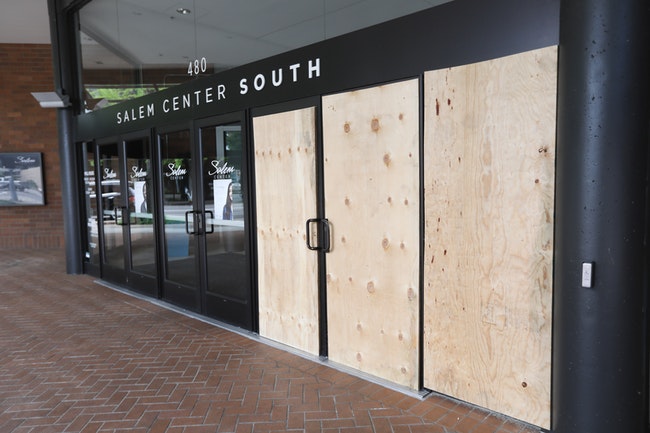
Boards cover broken glass doors at Salem Center on Sunday, May 31. Vandals broke the doors at the downtown shopping mall during a demonstration Saturday night. (Amanda Loman/Salem Reporter)
Barely a week after Marion County residents were allowed to venture out after COVID-19-related restrictions were lifted, the city of Salem again told people to stay home.
Beginning on Saturday, May 30, and again on the following Sunday and Monday, Salem City Manager Steve Powers enacted 8 p.m. curfews in response to volatile protests against police brutality similar to those that have erupted across the country and state.
City officials say the curfew is one tool to prevent rioting and protect the public. But the use of the curfew has raised questions among Salem residents about whether it’s being selectively enforced as well as its effectiveness.
In Salem, protests spurred by the police killing of Minneapolis man George Floyd have continued well past 8 p.m. before officers stepped in to enforce the curfew.
While the protests that typically start at the Capitol have been closely watched by police, reports have emerged that individuals armed with military-style rifles standing guard outside of businesses haven’t been subject to the curfew.
“It is essentially granting law enforcement unchecked authority and broad authority to crack down on people who are doing nothing wrong,” said Kelly Simon, interim legal director for the ACLU of Oregon.
Curfews have been used by city officials in Salem, Eugene and Portland. But Simon said that cities already have a broad set of laws to address property destruction or other negative behaviors that have accompanied protests.
Calling curfews a “recipe for bias and selective enforcement,” she said they are used to crack down on protesters while making exceptions for people going to work or seeking medical care.
She also said that curfews are ineffective since people have turned up to protests regardless.
But Salem Police Chief Jerry Moore said that when police began enforcing curfew against protesters, they also told others in downtown who weren’t protesting to go home as well.
He said that police have broad discretion in how they enforce the law, including the curfew.
“We decided to make an exception to the curfew because we had a group of peaceful protesters who were making a statement in a peaceful manner that we thought was appropriate,” he said. He added that it was important for people to come together and make a statement.
He said that the curfew was put in place as a precaution for the potential of disruptive or dangerous behavior and was warranted because of riots that have occurred elsewhere.
“We do it, really, for the protection of the community,” he said.
Salem Mayor Chuck Bennett said he observed Monday’s protest from the police command center and the response from law enforcement. He said he observed police officers instruct people in Salem who weren’t involved in the demonstrations to go home as well. Between 10 p.m. and 11 p.m., he said he saw individuals carrying rifles leave downtown after being told by police to leave.
“It’s not being used discriminately,” he said.
According to Salem police, after protests wound down on Saturday and Sunday, a several people remained who then confronted officers, broke windows, spray painted statues and destroyed other property.
Police say they prevented that pattern from happening a third night on Monday.
Police spokeswoman Lt. Debbie Aguilar said in an email that the protest and vigil went “very well.”
She said the crowd that gathered peacefully at the Capitol and then walked with police escorts along a route through downtown that ended at the new police facility on Northeast Division Street between Liberty and Commercial streets.
The protest and vigil concluded around 10 p.m. on Monday. Aguilar said that most protesters went home but a small group walked back to downtown and gathered near Northeast Winter and Chemeketa Streets.
Officers alerted them they were violating curfew and the group responded by throwing explosive devices, water and other objects at the officers.
Officers used a “flash bang,” a device that emits smoke and makes a loud noise, in an attempt to disperse the crowd, she said. There were no reports of officers or protesters injured but seven individuals were arrested and transported the Marion County Correctional Facility.
Judith Hartzelle, 20, of McMinnville, Jackson Swain, 19, of Keizer, Elias Ramirez-Perez, 18, of Salem, Brady Tavernier, 18, of Silverton, Kendyl Davis, 18, of Silverton and Piscilla Magana-Rangelr (whose age and residence wasn’t given) were all changed with trespass. Kloie Wilson, 22, of Salem, was charged with riot, second-degree trespass and carrying a concealed weapon.
On Sunday night, police arrested 13 following that demonstration.
Police also encountered a man loitering in the area who said he was starting to have a seizure. Officers performed CPR on the man before he was transported to the hospital for treatment.
Contact reporter Jake Thomas at 503-575-1251 or [email protected] or @jakethomas2009.









